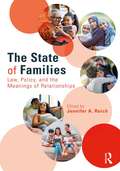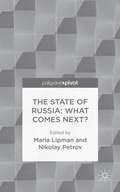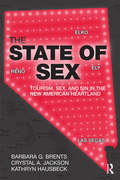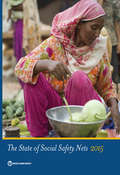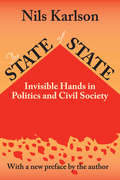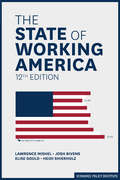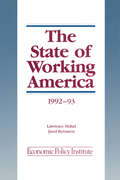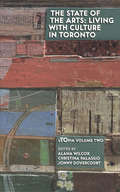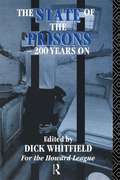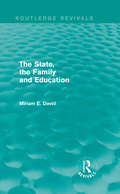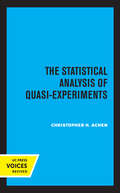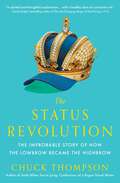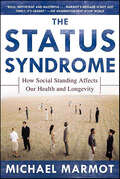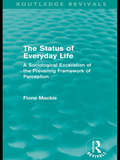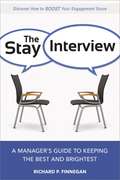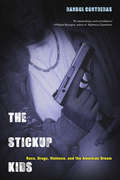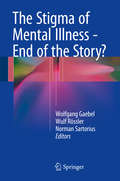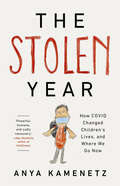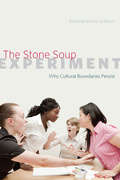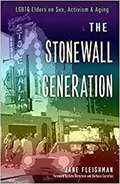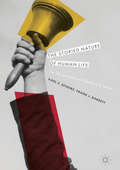- Table View
- List View
The State of Families: Law, Policy, and the Meanings of Relationships
by Jennifer A. ReichThe State of Families: Law, Policy, and the Meanings of Relationships collects essential readings on the family to examine the multiple forms of contemporary families, the many issues facing families, the policies that regulate families, and how families—and family life—have become politicized.This text explores various dimensions of "the family" and uses a critical approach to understand the historical, cultural, and political constructions of the family. Each section takes different aspects of the family to highlight the intersection of individual experience, structures of inequality—including race, class, gender, sexuality, disability, and immigration—and state power. Readings, both original and reprinted from a wide range of experts in the field, show the multiple forms and meanings of family by delving into topics including the traditional ground of motherhood, childhood, and marriage, while also exploring cutting edge research into fatherhood, reproduction, child-free families, and welfare. Taking an interdisciplinary approach to the family, The State of Families offers students in the social sciences and professionals working with families new ways to identify how social structure and institutional practice shape individual experience.
The State of Freedom: A Social History of the British State since 1800
by Patrick JoyceWhat is the state? The State of Freedom offers an important new take on this classic question by exploring what exactly the state did and how it worked. Patrick Joyce asks us to re-examine the ordinary things of the British state from dusty government files and post offices to well-thumbed primers in ancient Greek and Latin and the classrooms and dormitories of public schools and Oxbridge colleges. This is also a history of the 'who' and the 'where' of the state, of the people who ran the state, the government offices they sat in and the college halls they dined in. Patrick Joyce argues that only by considering these things, people and places can we really understand the nature of the modern state. This is both a pioneering new approach to political history in which social and material factors are centre stage, and a highly original history of modern Britain.
The State of Russia: What Comes Next?
by Maria Lipman Nikolay PetrovWritten by an international team of experts working on Russian development scenarios since 2007, this cutting edge Pivot examines Russia's reaction to the Ukraine crisis, and argues that subsequent decisions made by the Russian government have dashed hopes for Russia's modernization. Russia scholars whose expertise ranges from politics and economics to demographics and foreign policy analyse the changes that have occurred in Russia and address key issues such as foreign policy, the nature of the political and administrative system, the economy, relations between the centre and the regions, the state of Russian society and ideological facets of Putin's regime. Harsh confrontation with the West, isolationism within the country, militarization and increased government control of the economy, public and private space, as well as a crackdown on any independently-minded civic forces are all factors that have been rapidly obliterating gains made in the quarter of a century after the collapse of the communist regime. Both relevant and timely, this Pivot makes a key contribution to the debate on Russia's development and traces emerging trends in various spheres of Russian life, from the economy and foreign policy, to society and ideology.
The State of Sex: Tourism, Sex and Sin in the New American Heartland (Sociology Re-Wired)
by Barbara Brents Crystal Jackson Kathryn HausbeckThe State of Sex is a study of Nevada’s brothels that situates the nation's only legal brothel industry in the political economy of contemporary tourism. Nevada is part of the "new American heartland," as its pastimes, people, and politics have become more central to the nation. The rise of a service and leisure economy over the past sixty years has propelled sexuality into the heart of contemporary markets. Yet, neoliberal laws in the United States promote business but limit sexual commerce.How have Nevada's legal brothels survived, while the rest of the country criminalizes prostitution? How do brothels operate? Who works in them? This book brings social theory on globalizing economies, politics, leisure consumption, and emotional labor in interactive service work together with research on contemporary prostitution and sexual commerce. The authors employ an innovative, multi-method sociological approach, combining historical analysis of how the brothels came to be with over a decade's worth of ethnographic research on the current state of the industry.
The State of Social Safety Nets 2015
by The World BankOver the last decade, a policy revolution has been underway in the developing and emerging world. Country after country is systematically providing non-contributory transfers to poor and vulnerable people, in order to protect them against economic shocks and to enable them to invest in themselves and their children. Social safety nets or social transfers, as these are called, have spread rapidly from their early prominence in the middle-income countries of Latin America and Europe increasingly to nations in Africa, Asia and the Middle East - and today, over 130 developing countries have made investments in social safety nets an important pillar of economic development policies. The statistics and analysis in The State of Social Safety Nets 2015 capture this revolution, and reveal it in many dimensions at the country, regional, and international levels. This latest edition of a periodic series brings together a large body of data that was not previously available, drawing on the World Bank's ASPIRE database and other sources. Why have so many countries made a firm commitment to incorporate social safety nets as part of their social and economic policy architecture? Because social safety nets work. This report also reports on the rigorous evidence that demonstrates their impact, and also points the way to making them even more efficient and effective at meeting their development goals. This latest edition of a periodic series brings together a large body of data that was not previously available, drawing on the World Bank's ASPIRE database and other sources to examine trends in coverage, spending, and safety nets program performance.
The State of State: Invisible Hands in Politics and Civil Society
by Nils KarlsonOne of the most astonishing features of social, economic, and political life is that large-scale patterns, structures, and behavioral regularities sometimes develop without anyone intentionally planning their occurrence, or without anyone deliberately working to bring them about. They evolve as a specific kind of unintended consequence of human action. They are the result of invisible hands. Building on Adam Smith's classic concept of "the invisible hand," this study presents a general approach, based on the theory of games and evolutionary theory, to explain such large-scale unintended consequences within markets, communities, and the state. This analysis by Nils Karlson is further used to explain the growth of the modern "welfare" state. It shows how an unconstrained democratic state through two distinct invisible-hand processes, the logic of conceit and the logic of opportunism, may develop into a "equilibrium" state, "The State of State." His work moves classic political economy into the world of political sociology. A normative contractual model is presented and the relative desirability of the state, markets, and communities is discussed. A major conclusion is that it is a choice between imperfect alternatives, involving decisions about more or less, rather than absolute judgments of an either/or variety. It is nevertheless suggested that society ought to be radically depoliticized and that constitutional constraints should be introduced in the universe of policy-making.
The State of Welfare
by Gilbert Y. SteinerThis book examines the state of public welfare in the United States.
The State of Working America
by Josh Bivens Lawrence Mishel Elise Gould Heidi ShierholzPraise for previous editions of The State of Working America: "The State of Working America remains unrivaled as the most-trusted source for a comprehensive understanding of how working Americans and their families are faring in today's economy. "-Robert B. Reich "It is the inequality of wealth, argue the authors, rather than new technology (as some would have it), that is responsible for the failure of America's workplace to keep pace with the country's economic growth. The State of Working America is a well-written, soundly argued, and important reference book. "-Library Journal "If you want to know what happened to the economic well-being of the average American in the past decade or so, this is the book for you. It should be required reading for Americans of all political persuasions. "-Richard Freeman, Harvard University "A truly comprehensive and useful book that provides a reality check on loose statements about U. S. labor markets. It should be cheered by all Americans who earn their living from work. "-William Wolman, former chief economist, CNBC's Business Week "The State of Working America provides very valuable factual and analytic material on the economic conditions of American workers. It is the very best source of information on this important subject. "-Ray Marshall, University of Texas, former U. S. Secretary of Labor "An indispensable work . . . on family income, wages, taxes, employment, and the distribution of wealth. "-Simon Head, The New York Review of Books "No matter what political camp you're in, this is the single most valuable book I know of about the state of America, period. It is the most referenced, most influential resource book of its kind. "-Jeff Madrick, author of The End of Affluence "This book is the single best yardstick for measuring whether or not our economic policies are doing enough to ensure that our economy can, once again, grow for everybody. "-Richard A. Gephardt "The best place to review the latest developments in changes in the distribution of income and wealth. "-Lester Thurow The State of Working America, prepared biennially since 1988 by the Economic Policy Institute, includes a wide variety of data on family incomes, wages, taxes, unemployment, wealth, and poverty-data that enable the authors to closely examine the effect of the economy on the living standards of the American people. This edition, like the previous ones, exposes and analyzes the most recent and critical trends in the country.
The State of Working America: 1992-93 (State Of Working America Ser.)
by Jared Bernstein Lawrence Mishel John SchmittDrawing on a variety of data on family incomes, taxes, wages, employment, wealth, health care and poverty, this text provides a portrait of the living standards of Americans in the mid-1990s. It contains up-to-date data from the US Census.
The State of the Arts: Culture in Toronto (uTOpia)
by Alana Wilcox Christina PalassioFreakier rich people. More suburban art. A venue for new music. Better staplers. An infrastructure for hip-hop. Laneway art. More wi-fi. A more understanding marriage between art and business. Affordable live-work spaces. What would make Toronto a better place for the arts? City Hall proclaimed 2006 the Year of Creativity. 'Live With Culture' banners flap over the city. And across the city, donors are ponying up millions for the ROM and the AGO. Culture's never had it so good. Right?The State of the Arts explores the Toronto culture scene from every angle, applauding, assailing and arguing about art in our fair burg. The essays consider the big-ticket and the ticket-free, from the CNE to unintentional art. In between, you'll find thoughts on the 'creative city' and photobloggers, Toronto on film and the fine line between part and art. Taken together the thoughts of these writers, artists and city-builders create a snapshot of culture in T.O. as it grows from 'Toronto the Good' to 'Toronto the Could' to 'Toronto the Can-Do.'Includes sixteen colour pages of eye-level Toronto, and cover art by Susan Szenes.With essays by Sandra Alland, Jason Anderson, Anna Bowness, Stephen Cain, Kate Carraway, Hanna Cho, Brendan Cormier, Natalie De Vito, Liz Forsberg, Mark Fram, Marc Glassman, Katarina Gligorijevic-Collins, Brenda Goldstein, Amy Lavender Harris, Karen Hines, Sarah B. Hood, Christopher Hume, Sam Javanrouh, Dory Kornfeld, Adam Krawesky, More Or Les, John Lorinc, James MacNevin, Claudia McKoy, Brian McLachlan, Ryan McLaren, Shawn Micallef, Jill Murray, Matt O'Sullivan, Christopher Pandolfi, Michael Redhill, Dylan Reid, Damian Rogers, Stuart Ross, Lisa Rundle, Dana Samuel, Nadja Sayej, Susan Szenes, Kevin Temple, Pablo Torres, Gayla Trail, Rannie Turingan, Jason van Eyk, Adam Vaughan, RM Vaughan, Stéphanie Verge, Lisa Whittington-Hill and Carl Wilson.
The State of the Prisons - 200 Years On
by Dick WhitfieldIn 1777 John Howard wrote The State of the Prisons in England and Wales, with Preliminary Observations and an Account of Some Foreign Prisons. Two centuries later, this extraordinary document commemorates his achievements in campaigning for reform. In the spirit of Howard himself, the Howard League for Penal Reform have compiled detailed observations of prisons from Sweden to South Africa, and from India to Nicaragua. The result is a valuable resource which includes unique insights into previously undocumented prison regimes.
The State, the Family and Education (Routledge Revivals)
by Miriam DavidIn The State, The Family and Education, first published in 1980, Miriam David provides an entirely new analysis of the relationship of the State to the family and education. David shows how the State, through its educational policies, regulates family relationships with, and within, schools. This book provides a welcome analysis of educational policy from a socialist-feminist perspective, re-examining the ways in which women as parents, teachers and pupils are involved in the education system. This book will be of interests to students of education.
The Statistical Analysis of Quasi-Experiments
by Christopher H. AchenThis title is part of UC Press's Voices Revived program, which commemorates University of California Press’s mission to seek out and cultivate the brightest minds and give them voice, reach, and impact. Drawing on a backlist dating to 1893, Voices Revived makes high-quality, peer-reviewed scholarship accessible once again using print-on-demand technology. This title was originally published in 1986.
The Status Revolution: The Improbable Story of How the Lowbrow Became the Highbrow
by Chuck ThompsonHow did rescue dogs become status symbols? Why are luxury brands losing their cachet? What&’s made F. Scott Fitzgerald&’s most famous observations obsolete? The answers are part of a new revolution that&’s radically reorganizing the way we view ourselves and others.Status was once easy to identify—fast cars, fancy shoes, sprawling estates, elite brands. But in place of Louboutins and Lamborghinis, the relevance of the rich, famous, and gauche is waning and a riveting revolution is underfoot. Why do dog owners boast about their rescues, but quietly apologize for their purebreds? Why do people brag about their grinding workweeks? Why are so many billionaires anxious to give (some of) their money away rather than hoard it? In The Status Revolution, Chuck Thompson—dubbed &“savagely funny&” by The New York Times and &“wickedly entertaining&” by the San Francisco Chronicle—sets out to determine what &“status&” means today and learns that what was once considered the low life has become the high life. In The Status Revolution, Thompson tours the new world of status from a small community in British Columbia where an indigenous artist uses wood carving to restore communal status; to a Washington, DC, meeting of the &“Patriotic Millionaires,&” a club of high-earners who are begging the government to tax them; to a luxury auto factory in the south of Italy where making beautiful cars is as much about bringing dignity to a low-earning region than it is about flash and indulgence; to a London lab where the neural secrets of status are being unlocked. &“This isn&’t a book about designer brands or orgies of overindulgence,&” Thompson writes. &“Even if I cared about them, the preferences of the rich, famous, and gauche have already been covered more exhaustively than a guy in my tax bracket could ever hope to fake.&” With his signature wit and irreverence, Thompson explains why everything we know about status is changing, upends centuries of conventional wisdom, and shows how the new status revolution reflects our place in contemporary society.
The Status Syndrome: How Social Standing Affects Our Health and Longevity
by Michael MarmotBased on decades of his own research, a pioneering epidemiologist reveals the surprising factors behind who lives longer and whyYou probably didn't realize that when you graduated from college you increased your lifespan, or that your co-worker who has a master's degree is more likely to live a longer and healthier life. Seemingly small social differences in education, job title, income, even the size of your house or apartment have a profound impact on your health.For years we have focused merely on how advances in technology and genetics can extend our lives and cure disease. But as Sir Michael Marmot argues, we are looking at the issue backwards. Social inequalities are not a footnote to the real causes of ill health in industrialized countries; they are the cause. The psychological experience of inequality, Marmot shows, has a profound effect on our lives. And while this may be alarming, it also suggests a ray of hope. If we can understand these social inequalities, we can also mitigate their effects. In this groundbreaking book, Marmot, an internationally renowned epidemiologist, marshals evidence from around the world and from nearly thirty years of his research to demonstrate that how much control you have over your life and the opportunities you have for full social participation are crucial for health, well-being, and longevity. Just as Bowling Alone changed the way we think about community in America, The Status Syndrome will change the way we think about our society and how we live our lives.
The Status of Everyday Life: A Sociological Excavation of the Prevailing Framework of Perception (Routledge Revivals Ser.)
by Fiona MackieFirst Published in 2010. Routledge is an imprint of Taylor & Francis, an informa company.
The Stay Interview: A Manager's Guide to Keeping the Best and Brightest
by Richard FinneganOf all the obstacles and surprises managers know are heading their way each day, the one they least anticipate and prepare for is the resignation of a seemingly happy and extremely valued employee. It’s the cement truck they never saw coming their way--but they could have.This invaluable resource introduces managers to a powerful new engagement and retention tool that they absolutely must begin utilizing ASAP: the stay interview. Smart companies and managers who have realized the importance of being proactive with their employees and not taking anything for granted have begun conducting these periodic reviews in order to discover why their important talent might leave and to solve any problems before they actually quit.Written by the retention expert who pioneered the process, The Stay Interview shows managers how to: • Prepare for the stay interview• Anticipate an employee's top issues• Respond to difficult questions• Listen effectively and dig deeper• Craft a detailed and effective stay plan complete with timeline• Assess each employee's level of engagement, predict potential exits, and communicate results to upper managementWhen you have the right people in place, you can’t risk losing them. Complete with the five best questions to ask and sample scripts for different situations, The Stay Interview provides the key to saving yourself unnecessary headaches and surprises.
The Stickup Kids
by Randol ContrerasRandol Contreras came of age in the South Bronx during the 1980s, a time when the community was devastated by cuts in social services, a rise in arson and abandonment, and the rise of crack-cocaine. For this riveting book, he returns to the South Bronx with a sociological eye and provides an unprecedented insider's look at the workings of a group of Dominican drug robbers. Known on the streets as "Stickup Kids," these men raided and brutally tortured drug dealers storing large amounts of heroin, cocaine, marijuana, and cash. As a participant observer, Randol Contreras offers both a personal and theoretical account for the rise of the Stickup Kids and their violence. He mainly focuses on the lives of neighborhood friends, who went from being crack dealers to drug robbers once their lucrative crack market opportunities disappeared. The result is a stunning, vivid, on-the-ground ethnographic description of a drug robbery's violence, the drug market high life, the criminal life course, and the eventual pain and suffering experienced by the casualties of the Crack Era. Provocative and eye-opening, The Stickup Kids urges us to explore the ravages of the drug trade through weaving history, biography, social structure, and drug market forces. It offers a revelatory explanation for drug market violence by masterfully uncovering the hidden social forces that produce violent and self-destructive individuals. Part memoir, part penetrating analysis, this book is engaging, personal, deeply informed, and entirely absorbing.
The Stigma of Mental Illness - End of the Story?
by Norman Sartorius Wolfgang Gaebel Wulf RösslerThis book makes a highly innovativecontribution to overcoming the stigma and discrimination associated with mentalillness - still the heaviest burden both for those afflicted and those caringfor them. The scene is set by the presentation of different fundamentalperspectives on the problem of stigma and discrimination by researchers,consumers, families, and human rights experts. Current knowledge and practiceused in reducing stigma are then described, with information on the programmesadopted across the world and their utility, feasibility, and effectiveness. Thecore of the volume comprises descriptions of new approaches and innovativeprogrammes specifically designed to overcome stigma and discrimination. In theclosing part of the book, the editors - all respected experts in the field -summarize some of the most important evidence- and experience-basedrecommendations for future action to successfully rewrite the long andburdensome 'story' of mental illness stigma and discrimination.
The Stolen Year: How COVID Changed Children's Lives, and Where We Go Now
by Anya KamenetzAn NPR education reporter shows how the pandemic disrupted children&’s lives—and how our country has nearly always failed to put our children first The onset of COVID broke a 150-year social contract between America and its children. Tens of millions of students lost what little support they had from the government—not just school but food, heat, and physical and emotional safety. The cost was enormous. But this crisis began much earlier than 2020. In The Stolen Year, Anya Kamenetz exposes a long-running indifference to the plight of children and families in American life and calls for a reckoning. She follows families across the country as they live through the pandemic, facing loss and resilience: a boy with autism in San Francisco who gains a foster brother and a Hispanic family in Texas that loses a member to COVID, and finds solace when they need it most. Kamenetz also recounts the history that brought us to this point: how we thrust children and caregivers into poverty, how we over-police families of color, how we rely on mothers instead of infrastructure. And how our government, in failing to support our children through this tumultuous time, has stolen years of their lives.
The Stone Soup Experiment: Why Cultural Boundaries Persist
by Deborah DowningThe Stone Soup Experiment is a remarkable story of cultural difference, of in-groups, out-groups, and how quickly and strongly the lines between them are drawn. It is also a story about simulation and reality, and how quickly the lines between them can be dismantled. In a compulsively readable account, Deborah Downing Wilson details a ten-week project in which forty university students were split into two different simulated cultures: the carefree Stoners, and the market-driven Traders. Through their eyes we are granted intimate access to the very foundations of human society: how group identities are formed and what happens when opposing ones come into contact. The experience of the Stoners and Traders is a profound testament to human sociality. Even in the form of simulation, even as a game, the participants found themselves quickly—and with real conviction—bound to the ideologies and practices of their in-group. The Stoners enjoyed their days lounging, chatting, and making crafts, while the Traders—through a complex market of playing cards—competed for the highest bankrolls. When they came into contact, misunderstanding, competition, and even manipulation prevailed, to the point that each group became so convinced of its own superiority that even after the simulation’s end the students could not reconcile. Throughout her riveting narrative, Downing Wilson interweaves fascinating discussions on the importance of play, emotions, and intergroup interaction in the formation and maintenance of group identities, as well as on the dynamic social processes at work when different cultural groups interact. A fascinating account of social experimentation, the book paints a vivid portrait of our deepest social tendencies and the powers they have over how we make friends and enemies alike.
The Stone Soup Experiment: Why Cultural Boundaries Persist
by Deborah Downing WilsonThe Stone Soup Experiment is a remarkable story of cultural difference, of in-groups, out-groups, and how quickly and strongly the lines between them are drawn. It is also a story about simulation and reality, and how quickly the lines between them can be dismantled. In a compulsively readable account, Deborah Downing Wilson details a ten-week project in which forty university students were split into two different simulated cultures: the carefree Stoners, and the market-driven Traders. Through their eyes we are granted intimate access to the very foundations of human society: how group identities are formed and what happens when opposing ones come into contact. The experience of the Stoners and Traders is a profound testament to human sociality. Even in the form of simulation, even as a game, the participants found themselves quickly--and with real conviction--bound to the ideologies and practices of their in-group. The Stoners enjoyed their days lounging, chatting, and making crafts, while the Traders--through a complex market of playing cards--competed for the highest bankrolls. When they came into contact, misunderstanding, competition, and even manipulation prevailed, to the point that each group became so convinced of its own superiority that even after the simulation's end the students could not reconcile. Throughout her riveting narrative, Downing Wilson interweaves fascinating discussions on the importance of play, emotions, and intergroup interaction in the formation and maintenance of group identities, as well as on the dynamic social processes at work when different cultural groups interact. A fascinating account of social experimentation, the book paints a vivid portrait of our deepest social tendencies and the powers they have over how we make friends and enemies alike.
The Stonewall Generation: LGBTQ Elders on Sex, Activism, and Aging
by Kate Bornstein Barbara Carrellas Jane FleishmanIn The Stonewall Generation: LGBTQ Elders on Sex, Activism, and Aging, sexuality researcher Jane Fleishman shares the stories of fearless elders in the LGBTQ community who came of age around the time of the Stonewall Riots of 1969. In candid interviews, they lay bare their struggles, strengths, activism, and sexual liberation in the context of the political movements of the 1960s and 1970s and today. Each of these inspiring figures has spent a lifetime fighting for the right to live, love, and be free, facing challenges arising from their sexual orientation, gender, race, ethnicity, religion, politics, disabilities, kinkiness, non-monogamy, and other identities. These are the stories of those whose lives were changed forever by Stonewall and who in turn became agents of change themselves. <p><p> A sex-positive and unapologetic depiction of LGBTQ culture and identity, The Stonewall Generation includes the voices of those frequently marginalized in mainstream tellings of LGBTQ history, lifting up the voices of people of color, transgender people, bisexual people, drag queens, and sex workers. We need to hear these voices, particularly at a time when our country is in the middle of a crisis that puts hard-won civil and human rights at risk, values we’ve fought for again and again in our nation’s history. <p><p> For anyone committed to intersectional activism and social justice, The Stonewall Generation provides a much-needed resource for empowerment, education, and renewal.
The Storied Nature of Human Life
by Frank J. Barrett Karl E. ScheibeThis book explores Theodore Sarbin's life and work, and includes 10 of Sarbin's publications from the last two decades of his life. Theodore R. Sarbin had a career in psychology that spanned 70 years, establishing a place for social role theory in contemporary psychology and making major contributions to understandings of hypnosis, psychopathology, criminal behaviour, and imagination. This book amplifies the voice and influence of one of the most significant critical thinkers in psychology of the last century. The book serves as a commentary on changes now taking place in contemporary psychology; it is historically informed and yet focused on the future of psychological theory and practice. The book will be of great interest to psychologists, philosophers and social scientists.
The Stories We Are
by William RandallFrom time to time we all tend to wonder what sort of "story" our life might comprise: what it means, where it is going, and whether it hangs together as a whole. In The Stories We Are, William Lowell Randall explores the links between literature and life and speculates on the range of storytelling styles through which people compose their lives. In doing so, he draws on a variety of fields, including psychology, psychotherapy, theology, philosophy, feminist theory, and literary theory.Using categories like plot, character, point of view, and style, Randall plays with the possibility that we each make sense of the events of our lives to the extent that we weave them into our own unfolding novel, as simultaneously its author, narrator, main character, and reader. In the process, he offers us a unique perspective on features of our day-to-day world such as secrecy, self-deception, gossip, prejudice, intimacy, maturity, and the proverbial "art of living."First published in 1995, this second edition of The Stories We Are includes a new preface and afterword by the author that offer insight into his argument and evolution as a scholar, as well as an illuminating foreword by Ruthellen Josselson.
